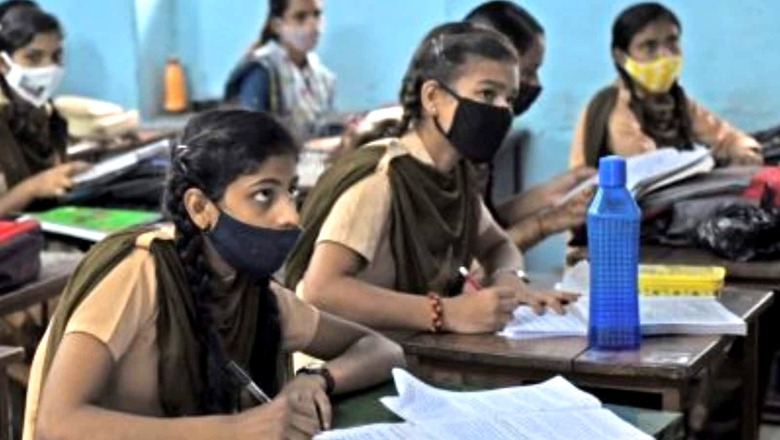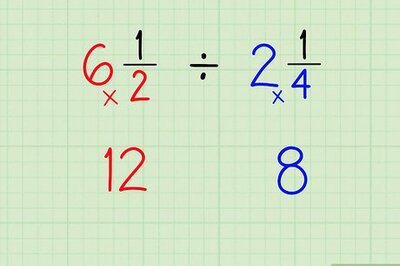
views
What is it about the board exams that is unshakeable, indispensable and almost sacred that any effort to change its nature or importance meets with stiff resistance. The notion of merit/hard work being rewarded and it’s obverse being penalised is deeply associated with them. This strong belief that the school education system will collapse without them is perhaps the reason that any attempt to tinker with board exams is viewed with suspicion and condemned.
This article is with reference to the recent attempt by the Central Board of Secondary Education (CBSE), Council for the Indian School Certificate Examination (CISCE) and other state and central education boards, which had made a plea to the Supreme Court to cancel the second part of board examination (this year, the board exams have been split into two parts, while the first part is over, the second part is yet to be conducted). While the Supreme Court admitted the plea for a quick hearing, the bench observed that such petition creates confusion and false hope. It further advised that ‘let the students do their job and let the authorities do their job,’ which seems to be a rather mechanical solution to a complex problem. Last year due to the pandemic and disruption of classes, all state and central education boards had cancelled their board examinations and applied alternative methods of evaluation.
I don’t think that there is anyone who has been through schooling and skipped the tyranny of board exams. Children not just experience but continue to be haunted even after leaving school, by repercussions of the inability to succeed in these exams. Failure or poor performance in them has consequences for the teachers and the school as well. The fear around it is used to make the child serious about studies right from the time they enter school.
What Makes Board Exams Sacrosanct
Let us try and understand what is it about board exams that make them so sacrosanct. But before that some basic features about them — they are end of the term examinations so they assess learning which has taken place over the past one year; they are public examinations which are dissociated with the school that the child goes to and the teachers who teach them; their marks are used to filter students for some scarce resources, like admission to a college etc. It is also true that they have caused immense pain and suffering to the child which has been reported in newspapers, acknowledged and formed the subject matter of several research studies. It is also true that several education committees have criticised their harmful effects and also questioned the purpose they serve, while constantly reiterating their inegalitarian and skewed nature.
It must also be noted that the Right of Children to Free and Compulsory Education Act, 2009 mandated certain assessment reforms which stated that till Class 8, there will be no board exams; students will be assessed in a continuous and comprehensive manner and students even on failing in the internal assessment will not be detained and made to repeat a class. These provisions received a lot of flak and in 2019 the RTE was amended and these provisions removed. The board exams came back with a vengeance as early as Classes 5 and 8.
Now let us understand the functions board exams serve in our society that nobody wants to let go of them, be it the bureaucratic machinery linked to school education, political leaders, parents and teachers. The Indian society is divided along several dimensions like caste, class, gender, religion, ethnicity etc. placing/ranking people one above the other. After Independence, due to inadequate financial resources, education could not become a fundamental right but was kept under Part Four of the Indian Constitution – the Directive Principles of State Policy which are not justiciable. Therefore, a graded school education system was evolved within both public and private school system. Implication of all this was, differential schools with varied infrastructural facilities and teacher quality etc. to be accessed by students depending on their socio-economic backgrounds.
The common school system discussed in Kothari Commission report, 1964–66 was theoretically hailed as a great idea but never implemented. The state also kept adding layers to the already fractured system of education — example, Sainik School, Navodaya Vidyalaya, Pratibha Bal Vikas Vidyalaya. Similarly, the private school system has multiple layers of privilege ranging from skin sensor washrooms to no toilets at all. The board exams fit in very well with this structure of differentiated educational opportunities to children as it gives a sense of fairness and impartiality — same exam for everyone in determining allotment of awards and penalties.
ALSO READ | How to Beat Stress, Fear and Lack of Concentration? 7 Tips For Students Appearing For Board Exams
Strange as it may sound, it is true that children whether they come from affluent backgrounds and posh schools or from constrained home backgrounds and dysfunctional schools, the board exams treat them alike. What is even more interesting is that both students and their parents accept the board exam system to be fair and just. Nobody considers them to be biased or skewed in favour of children who come from privileged home and school backgrounds; nobody questions the nature of examinations and questions asked, which encourage students to memorise the textbook content without understanding. Most people hardly ever question the limited number of jobs or seats available in higher education institutions.
Why Board Exams are Here to Stay
Frankly, there is no-best system of examining students, for that depends on the objective of examination and the overall context in which the students are being examined. If the purpose is to test how much students have learnt in a given period, or screen students for an award etc., a conventional terminal exam which focuses on assessment of learning would be more desirable. On the other hand, if assessment is to support children to learn through the year then an internal school-based exam in which teachers assess students’ growth and continuously support it is better.
Let us be very clear that board exams are here to stay so long as the society is divided, and so is the school system. If one were to search for a perfect replacement for board exam, that is unlikely to be found. That is the reason why despite pandemic and students’ learning being affected, one is still obsessed with taking exams. One can certainly think of multiple and diverse ways of assessing students which are actually in accordance with diverse ways in which children learn. Focusing on examination alone will not achieve much but equal attention has to be given to nature of curricular resources, pedagogic transactions, teacher-pupil ratio etc. Most importantly, we must have hope in students that they are interested in learning and can learn best without fear and with complete trust in teachers that they have the welfare of students at heart and can meaningfully assess their performance and support them in their learning.
The author is Professor and Dean, School of Education, Tata Institute of Social Sciences, Mumbai. The views expressed in this article are those of the author and do not represent the stand of this publication.
Read all the Latest Opinion News and Breaking News here




















Comments
0 comment